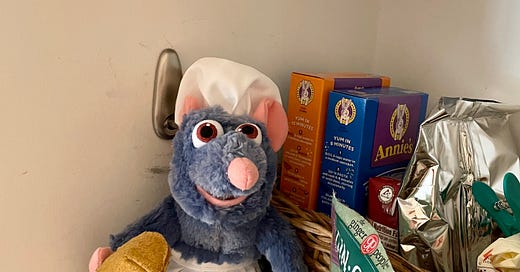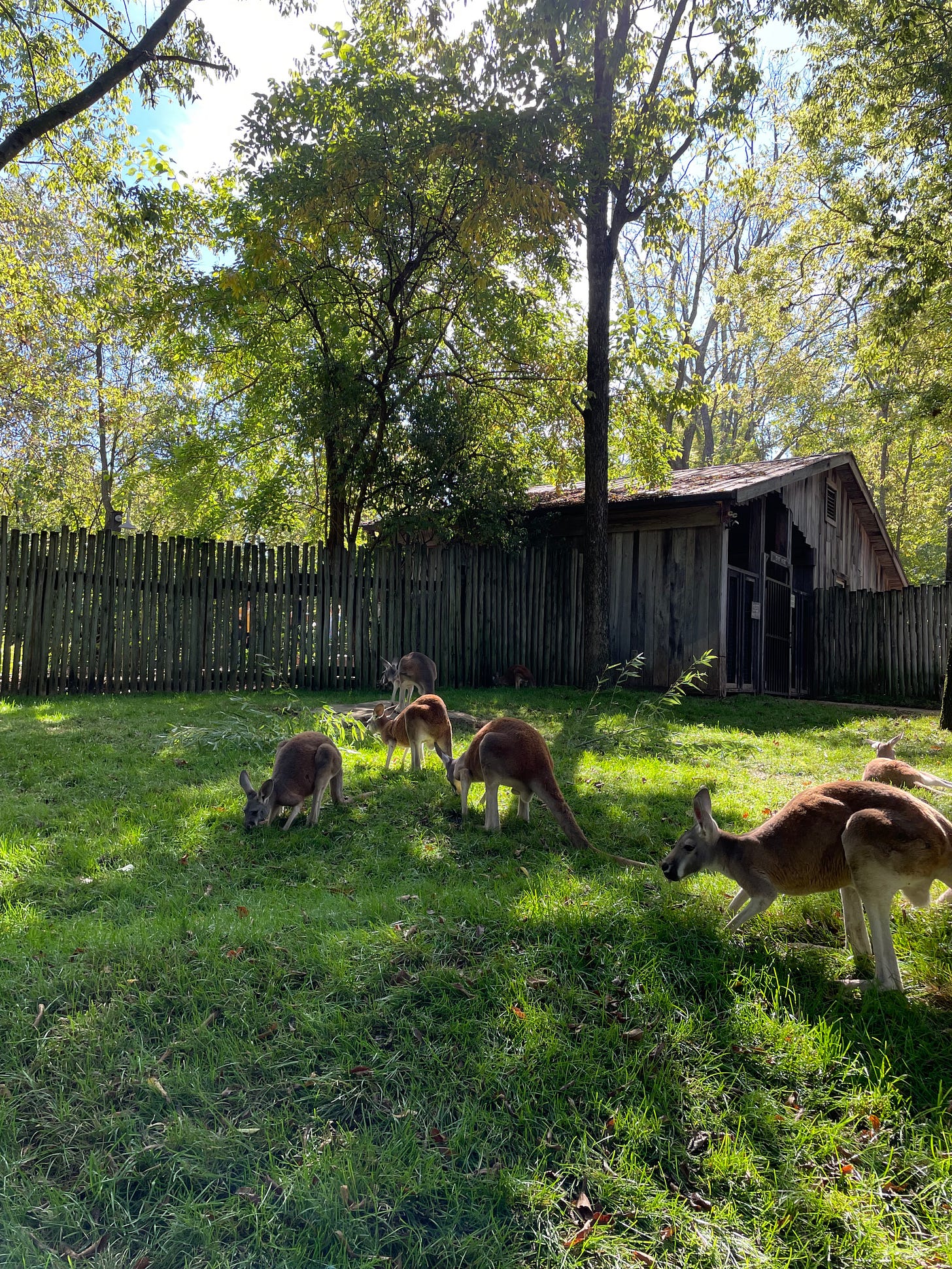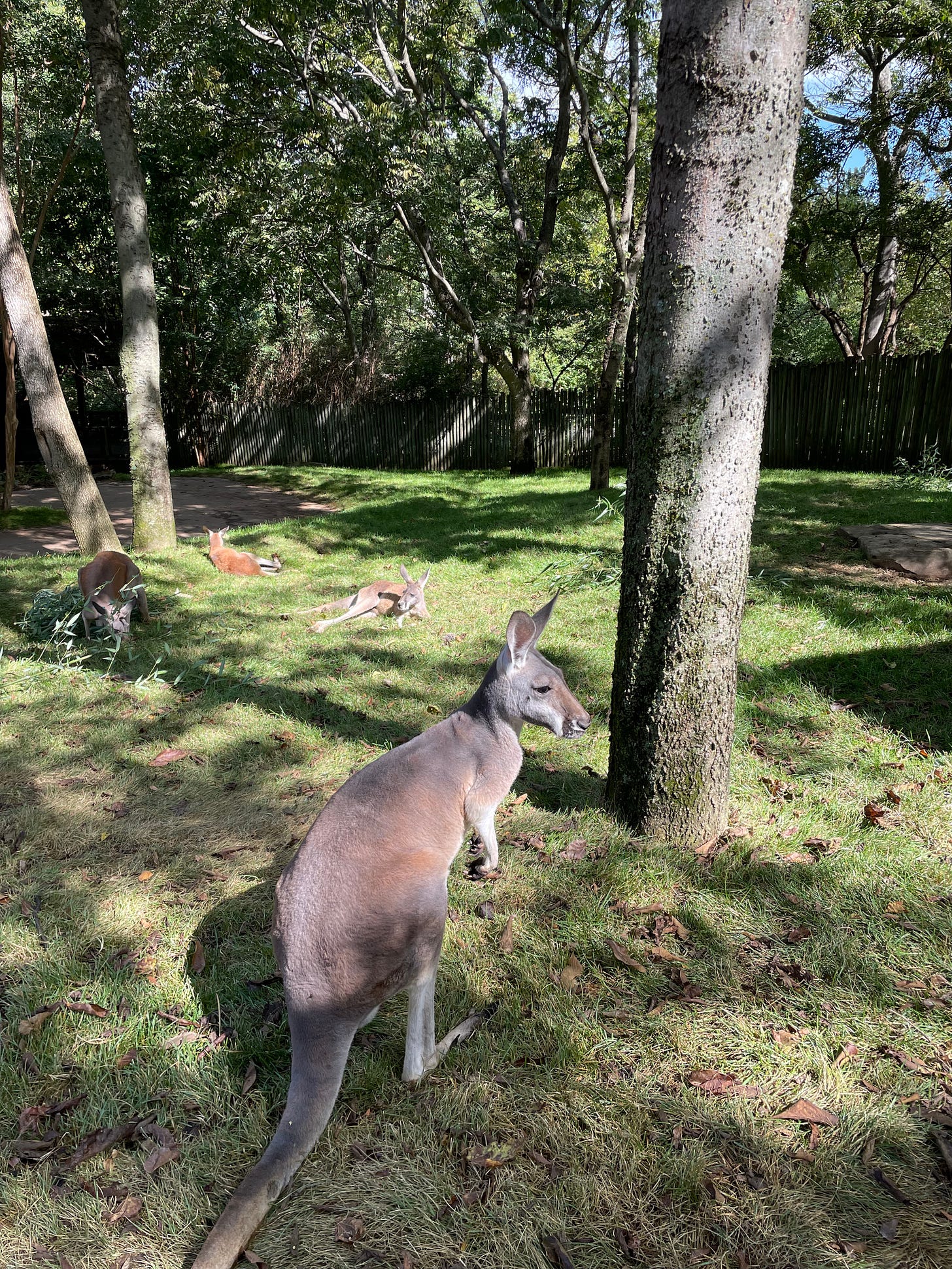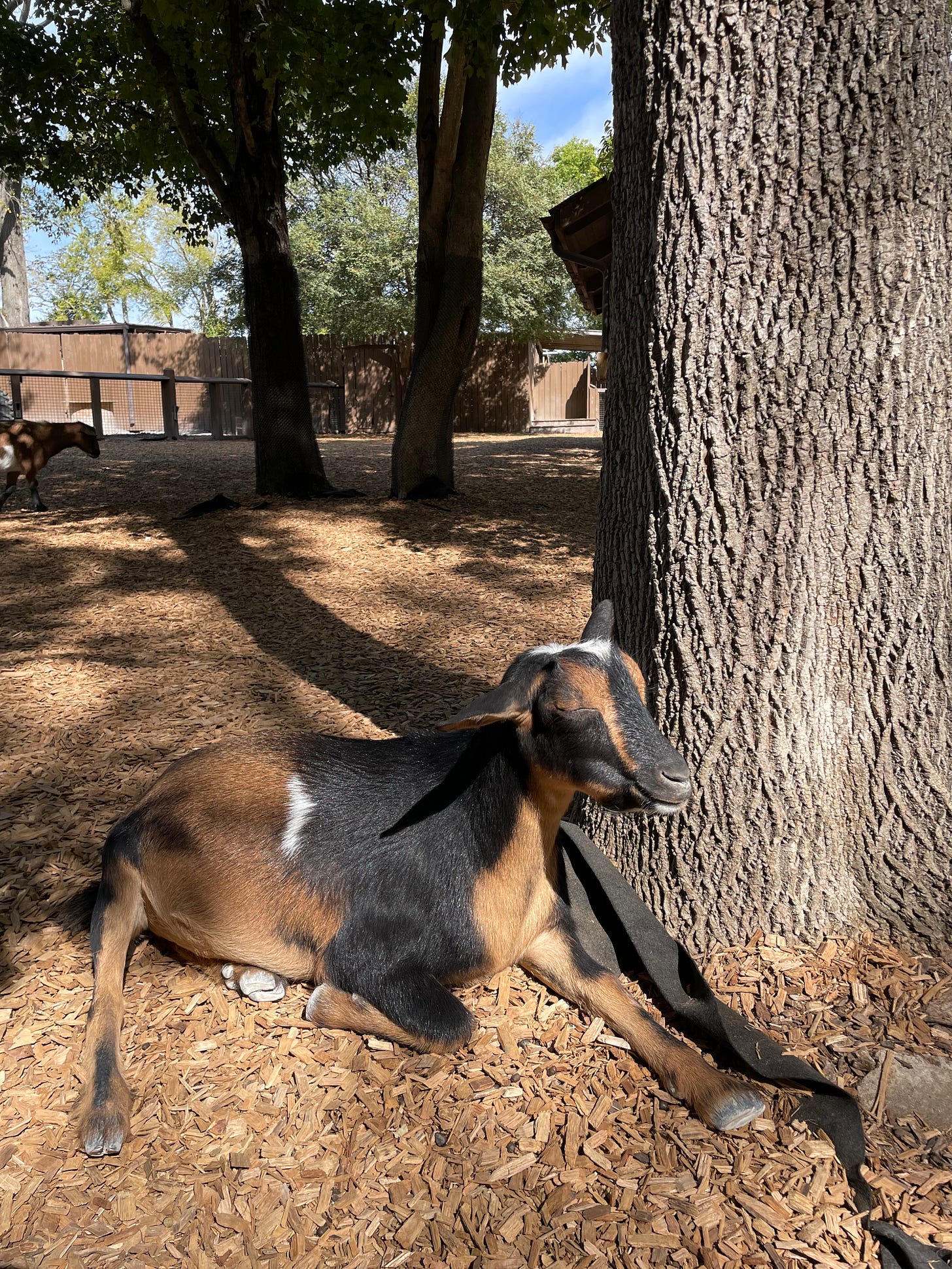Don’t freak—Carl writes. We have a mouse.
I read the message while my students work on drafting their personal narratives, their very first essay assignment for our writing class.
The day had been going relatively well. The baby woke up at 6:45am, giving me just enough time to feed her, dress her, take her to daycare early so I could sit at Starbucks and drink a coffee before heading to class. I had an easy day ahead, as drafting days also grant me time to write while I'm in the classroom. I can catch up on emails and research residencies and workshops and all the writerly things.
I was also preparing for Vanderbilt’s first visiting author, Sigrid Nunez, to arrive. I'm responsible for her itinerary and for making things go smoothly while she’s on campus. I’d be attending dinner with her in a few nights, a job perk I felt extremely imposter to have been granted.
I’d never seen a mouse in person before, so when I read the message, the image I conjured was part Rataouille-esque civilization beneath the floorboards and part disease-ridden, fang-bearing, disheveled grey mouse. My grad school boyfriend had rats in his attic (that was a fun time back in my twenties), but I never actually saw one. I only heard their little rat feet skitter through the air-conditioning ducts in the middle of the night and then the snap of the rattrap in the attic as it caught a rat by the tail. I’d sent him upstairs to gather the dead rat, which he wrapped up in a plastic Publix bag and carried out to the trash. A lump in the bottom of the bag was all I saw, so in a way, their existence felt dreamlike. Or rather, nightmarish.
I stay in the classroom until all my students leave. I pack up my laptop and my planner and pens and throw away the cup of coffee that had become cold with time. I walk slowly back to my car and drive home. I ask myself, What am I actually afraid of? Am I afraid of seeing the mouse? Am I afraid there might be more than just one? Am I afraid of it touching me, unexpectedly, like it had Carl? Am I afraid of the mouse itself or the idea of seeing it in my house?
When I open the door, I expect a Pixar scene: the mice zip lining across our house on dental floss and building a tower with my daughter’s baby blocks. But when I enter, there is only quiet. I unpack my bag at the kitchen table and set up camp there. I want to be above ground, my feet not touching the floor unless absolutely necessary. Carl had told me that he found the mouse because it brushed up against his foot in the bathroom. He proceeded to drive to Home Depot to buy traps, then to Publix to buy peanut butter, then home to set up the traps. “Now we wait,” he said after showing me where he’d placed each trap. I was glad for how proactive he was, how he wasn’t scared of the mouse, like I was, but he didn’t want him there either.
I remembered how my ex had started writing a short story about the rats in his apartment, a story about co-habitating with the rats and letting them thrive. In the story, which I read angrily standing over his desk before he got home from work, there was one rat that stepped forth among its society and opted to make peace with the human (my ex). It was a progressive story about acceptance. I found the story absolutely infuriating. I didn’t want to live with the rats. I wanted them dead. I wrote my own short story about the whole situation.
I wonder if he ever read it. I wonder if there are still rats in his apartment.
*
Sigrid’s novel, The Friend, which won the National Book Award in 2018, is about a woman who loses her lifelong best friend and mentor. In the wake of his death, she takes on his Great Dane who also suffers the loss of his master. The book is about loss and grief and isolation, but it is also about connection, a “celebration of human-canine devotion.”
When I picked up Sigrid from her hotel, the first thing she told me was that there was a noisy dog in the room next to her.
“He doesn’t even have a cute bark. A little yip, yip, yip, or something. It’s a bad bark.”
I offered to call the hotel and see if we could get her room switched, but she told me she’d already tried. “They’re full up,” she said and lowered the air-conditioning on the passenger side.
I wonder if the visiting authors know how nervous I am when I pick them up, how before I even leave my house, I'm planning what I should say. Is this your first time in Nashville? Do you need any coffee shop recommendations? Do you feel like with all of your accolades and accomplishments that you’ve done ‘enough’ or do you still feel like an imposter?
None of the writers have ever given me reason to be nervous. They’ve all been lovely, each and every one, but no matter, I'm still always anxious. I think what makes me more anxious is when they treat me like an equal.
I told Sigrid about the mouse. I told her that I’d be sitting at the kitchen table when I finally saw it, the little grey thing, which was, I have to admit, actually kind of cute. I saw him run across the floor from the laundry room to underneath the fridge. I watched as Carl moved one of the humane traps right in front of the open space there. I watched the mouse put his paws on top of the box and sniff around, trying to locate that sweet, delicious peanut butter treat. I saw his ears, his whiskers, his eyes.
I recounted to her that it wasn’t until dinner while Carl was outside grilling that I heard movement again and my eyes darted to the box trap. I signaled Carl to come inside and he tiptoed closer as I watched the mouse finally enter the box. We heard the trapdoor shut behind him and Carl raised a fist in the air. “We got him!”
“He drove a few miles away to release him,” I told her. “But we joked that maybe they should go have a beer before they part ways.”
“I feel a little bad now though,” I said. “Taking him away from his wife and kids. I mean, she probably thinks, ‘He went out to get milk? What’s taking him so long?’”
We pulled up to the restaurant and I let Sigrid out so I could go find parking. I didn’t need her to see me curse at every full space in the back parking lot or freak out as I drove down all the side streets panicked.
Dinner was a delight. We were joined by some other members of the department and all of us discussed how our semesters are going. Sigrid spoke about residencies and workshops that we should all apply to, regaling us with her past experiences and her travels. She asked everyone what their favorites were and I told her about the residency I did in Santa Cruz where I accidentally signed up to live on a commune for two weeks and then had a mental breakdown in the woods.
“You should write about that,” one of my colleagues said. “I have,” I told her.
Sigrid spoke about how New York was overrated, that she couldn’t understand why someone would live there if you could live in Wyoming or Utah or somewhere truly beautiful. She spoke about how there are always three kinds of students in creative writing classes: the brilliant ones, the okay ones, and the “how the hell did they get in this program?” ones. She asked me if this was my experience, since I’d mentioned I used to teach at a performing arts school.
“Well,” I said, “It’s hard to say because I’ve never taught in a true workshop before. I was teaching writing, but most of my students were actors and singers and dancers. They were doing their stage makeup while I was trying to teach Mary Karr and Jo Ann Beard.”
I think I feel so imposter-y because the assumption is that I'm on everyone’s level that I work with at Vanderbilt, but in reality, I know I have a long way to go to get there. But yet, dinner after dinner, I sit at the same table as all these writers. They ask me questions as if I'm their peer. When their visit is over, they sign my copy of their book and thank me for the warm welcome and the hospitality. They often write me personalized notes when they sign. This time, Sigrid writes: With best wishes and many thanks for being such a lovely host.
*
“You’ve had enough rodent issues for a lifetime,” my friend Rebecca writes over text. We went to grad school together and she knows all about my rat woes.
“But I really do feel bad,” I joke, “Taking a husband away from its wife, away from its family, its babies.”
“While this is sad for the little mouse family, I’d take it over having to live with them myself. I’d be burning the house down.”
This is why we have remained friends. But still, I really do feel bad. I put myself in the mother-mouse’s place, her husband—poof—gone and her left wondering here he went; her ill fate of having to live the rest of her life alone with all that grief and isolation.
Carl said that when he opened the box and let the mouse out, he hesitated at first. The mouse looked around and sniffed the ground before running out into the grass and out of view. He was free, but alone, which is maybe the worst kind of free.
And while the mouse might have been solo in our home, might not have had a family at all like the one I imagined, we are a family. Carl, me, and our daughter are the family I’ve always wanted. They’re all I need. Everything else is an added bonus.
Carl often says that sometimes his former memories make him sad because our daughter wasn’t there. The memories feel incomplete because she’s missing. It really does feel like we’ve been waiting our whole lives for her to be here.
At the zoo this past weekend, the three of us walked through the reptile exhibit, an indoor space called “The Unseen New World.” The exhibit houses everything from turtles and lizards and snakes to fruit bats and frogs and a wide array of freshwater and saltwater fish. Our daughter particularly took to the fish in the exhibit—the bright blue water in the aquariums, the fish illuminated in their rainbow of colors.
While the three of us stood (our daughter strapped into the front-facing baby carrier on Carl’s chest) in front of an aquarium that held a purple fish with a yellow tail, I had a moment. A realization came upon me that froze me in time and space. This is forever, I thought and a wave of anxiety washed over me. It’s not about I don’t want to do this, but it’s more the thought of Can I do this? Am I capable? Am I worthy?
By the time we entered the Kangaroo Kickabout, the thought had left my mind. At the end of our visit, I had filled my camera roll with pictures of my daughter looking at various animals at the zoo. I zoom at in on her face, her eyes, trying to see if she’s looking at the animal or beyond it. Sometimes she reaches out a hand as if to pet the kangaroo, the goat, the llama. Sometimes she just stares as if in awe of one of God’s creatures.
*
When someone is “looking for rats,” it means they are looking for problems. My ex used to say of my attitude that I was focusing on the negatives instead of the positives. He wasn’t wrong.
Dreaming of a rat means you are worried or anxious at the moment. A rat as a spirit animal is identified with having a strong intuition or a sharp sense of opportunity and danger. Dreaming of mice could suggest feeling vulnerable about your life circumstances. Mice symbolize endurance, focus, wit, as well as disease and death. Rats can be harder to catch than mice. In the Bible, rats and mice are mainly associated with uncleanliness and sickness. During the Bubonic Plague, the Philistines sent gold replicas of mice and tumors to be placed on the Ark of the Covenant.
When I set out to write this newsletter, I had no idea how much mice would factor into it. I simply wanted to write about the mouse in our house, the one whose stay was brief, but meaningful.
I took one photo at the zoo of a goat sitting underneath a tree. The sun was hitting the goat just so that it cast a golden light across its face and body. The goat seemed to be at peace. The zoo is not the goat’s natural habitat, but it comforted me that maybe just maybe the goat was okay. Maybe the goat was happy here. Maybe the mouse was okay. Maybe the fish were okay. Maybe most of the time, the thing that I am afraid of is the fear of the thing and not the thing itself. Maybe I am afraid of my own fear.
Maybe I'm afraid that I don’t belong at dinner with Sigrid Nunez and my colleagues. Maybe I'm afraid that they think I'm “less than.” Maybe that’s all in my head. Maybe, as I dip my focaccia into the whipped goat cheese that our table is sharing, maybe I should enjoy it instead of questioning it like how I question everything all the time.
When I returned home from dinner, my daughter was already asleep in her crib. I asked Carl how the night went and I got ready for bed. I checked my phone and had a text message from Sigrid:
Hi Brittany. Just wanted to let you know they moved the doggie! Good night, Sigrid.
To which I replied: Wonderful!! All’s woof that ends woof!
*
Sigrid gives a craft talk to the MFA students that I sneak into. I’ve been given permission to attend these talks, but it still, of course, feels like I'm wriggling my way into the room.
She begins the talk by reading from a published piece of hers, “Life and Story,” where she responds to being asked the big question of “Why do you write?”
“I’m not sure why writers are so often asked to give their reasons for doing what they do. I don’t believe the same question is asked with anything like the same frequency of, say, visual artists or composers or performers. I have at times said that I write because it is what I know how to do, or because it is who I am, or because it has fulfilled this or that desire or need, and I have always been painfully conscious of how unsatisfactory these answers are.” (Life and Story, Nunez).
“Writing is as much about being away from the world as it is about being in the world,” she tells us. “You have to ask ‘Why am I doing this? What makes writing necessary? How do I justify the hours I spend inventing characters? How does it give my life meaning?’”
Sigrid also talks about her process, how she receives a line and goes from there:
I went to hear a man give a talk—the very first line of her novel, What Are You Through.
“It’s simple. It’s direct,” Sigrid says. “It gave me the questions of ‘Who is the I and who is the man? What is this talk about? Where is the I going?’”
At her reading later that night, a friend of mine asks me what my process is like, whether I start simple and go from there or whether I have a whole idea in mind when I sit down to write. I tell her that I feel like my process is so different than Sigrid’s, that I write mostly about memories and situations that won’t leave me alone, that when I write, I'm crafting a story around those moments and re-framing them.
When I think on it more, I’d say that writing allows me to practice unconditional positive regard for myself, for my characters, for the real people in my life that I'm writing about and transforming into some kind of art. I'm showing myself and my work complete support and acceptance no matter the story.
Sigrid reads from her forthcoming novel, The Vulnerables, at the Vanderbilt Bookstore. She reads from near the end of the book when a character reflects on realizing the frailty of life. During a trip with her Girl Scout troop, she bends down and puts her hand into a cold stream to touch a stone. She realizes that yes, time is like a stream you cannot stop, flowing in one direction, always. But such is life, too. You cannot stop life as it happens; all you can do is observe.
Sigrid’s narrator pulls her hand from the stream and returns to her troop, excited that she might share this newfound revelation, but ultimately realizing it must be kept to herself so that she not seem weird.
I think that I write because I'm weird, because I feel so separate from everyone and everything. I think I write to write myself into the world. I have trouble being in the world.
But I want to be in it.
*
Even though it’s been a week, no mice in sight, I still check behind the toilet seat every time I go into the bathroom. Where I imagine the grey fur, the curled up shape of a small mouse, I see only white tile.
Before bed, Carl tells me about the book he’s reading. The Peregrine by J.A. Baker. The book tracks the daily comings and goings of a pair of peregrine falcons in eastern England. The author became obsessive about following the birds and observed them in all their states of being: in the air, on the ground, eating, resting, making a kill, etc.
J.A. Baker was so immersed in his quest that he lost his sense of self. His humanness slowly dissolved.
“There’s a line that’s stayed with me,” Carl says. “Terror seeks out the odd, the sick, and the lost.”
I think writing seeks us out. We look for mice, for rats. We go to dinner, to readings. We feel apart despite the togetherness. We envy the ability to turn inward, to look outside ourselves.
We write because the mouse might very well be dead, his life cut short. But he also might be alive on a new adventure. The world might seem open to him, vast and large with endless possibilities.
When the sun rises, he might pause and look up toward the light, the light that covers everything.
—
Canvas Rebel featured me in their Stories & Insight where I discussed my writing backstory, a major lesson I’ve had to unlearn as an author, and building the most valuable skill of resilience.
Nashville locals— the next reading in the Gertrude C. & Harold S. Vanderbilt Visiting Writers Reading Series is fiction writer Jamil Jan Kochai! Readings are free and open to the public, and this one takes place on Thursday, October 12th at 7pm in Buttrick Hall 101 on Vanderbilt’s campus.
As always, thank you for reading, and here’s a shameless plug to say that I now accept a small, optional fee if you wish to become a paid subscriber :)









